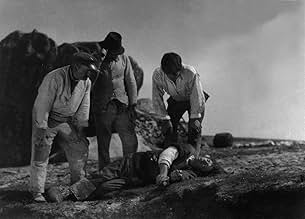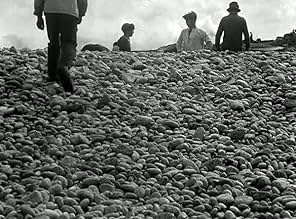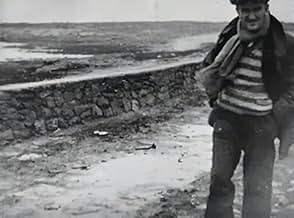Sur une île au large des côtes bretonnes, quatre hommes ramassent des algues. Deux jeunes meilleurs amis se disputent et lorsque son pouce est infecté, son ami doit risquer sa vie pour l'ame... Tout lireSur une île au large des côtes bretonnes, quatre hommes ramassent des algues. Deux jeunes meilleurs amis se disputent et lorsque son pouce est infecté, son ami doit risquer sa vie pour l'amener chez le médecin.Sur une île au large des côtes bretonnes, quatre hommes ramassent des algues. Deux jeunes meilleurs amis se disputent et lorsque son pouce est infecté, son ami doit risquer sa vie pour l'amener chez le médecin.
Histoire
Commentaire en vedette
By 1929 there was much that had already been achieved, innovated, or introduced in cinema as the silent era came to a close. Even so, especially with the relatively limited technology and knowledge of the time, let alone techniques or ideas that were either brand new or perhaps had not yet come to be in wide use, every feature had the chance to feel fresh and new. Here, early film-making icon Jean Epstein demonstrates an artfulness in the orchestration of most shots and scenes that I don't think would be seen again this heavily until the 1950s, 60s, and 70s; the cinematography, and the fundamental image, is mostly so crisp and clear that one could be forgiven for thinking that this was indeed made only 50 or so years ago, and not almost 100. This is to say nothing of how some shots are framed, nor handheld camerawork, the use of slow motion, overlaid images, tricks of the camera, or manipulated imagery, rapid editing and stylized intertitles - nor the almost documentary-style approach to the picture that weaves together a discrete narrative and a portrait of laborers harvesting seaweed. For that matter, the sea and the rocky landscapes are given a prominence in the movie, and very nearly a vitality of their own, recalling the ingenious silent masterpieces of Swedish legend Victor Sjöström, wherein the very environments were practically their own characters. By all this alone 'Finis terrae' is deeply engrossing, and highly satisfying, a terrific classic that absolutely deserves recognition and remembrance on its own merits, let alone as a surviving treasure of a bygone period in cinema.
And all that still leaves the particulars of this feature to consider. Accordingly working with local non-professionals, and basing his story on real-life events, Epstein gives us a tremendous understated drama of tension, and a certain pensive disquiet. The difficulty of the work itself, the challenges of the weather and season, and dynamics between people are all sufficient fuel in and of themselves to propel a plot; on top of these we're given the tale of a man who in these circumstances has to grapple with an injury, and the dependent nearby town that is increasingly troubled by the signs of something gone awry. By most any point of comparison the storytelling sits on the simpler side of things, but it's all that it needs to be to keep one sturdily engaged and entertained. Strong writing and direction of each scene, and shrewd editing, lets each moment carry its own weight in the story as it unfolds, a weight not truly any lesser than we'd expect of any title to follow in all the years since. Rather, for the strength of every component part - and noting the unexpected power of the climax, which leans even further into emphasis on the sea and the coastline and the parts they play herein - I think this quite stands just as tall as anything else Epstein made, many of its best contemporaries, and even many pictures to follow the advent of talkies. I'm not saying that 'Finis terrae' is an absolute essential must-see for one and all, and I can understand how some modern viewers have difficulty engaging with older fare. Be that as it may, in every capacity I think this is just as robust and outstanding as most anything one might hope to watch, and surely easily surpasses countless other titles. In fact, I had high expectations myself, having previously watched several of the filmmaker's other works, and still I'm impressed with just how rich and satisfying this 1929 feature is.
The momentous skill and intelligence illustrated in the film's craft is reason enough to watch as far as I'm concerned, and that the story is so enjoyable is just icing on the proverbial cake. As a matter of personal preference this may not find equal favor with all, yet I'm so very pleased with just how good the end result is, and throughout the entirety of these eighty minutes I was all but enthralled by one facet or another. As a side note, French post-rock band FAZE performed an improvised score live alongside a showing at a film festival in 2020, and video of the occasion (that is, Epstein's film with their musical accompaniment) is easily found online. The twenty-first century music is a rapturous, flavorful joy in and of itself, and is actually a superb, somewhat atmospheric complement to the movie of many decades past. This, too, is all the more reason to check out 'Finis terrae' if one has the chance, and I believe FAZE significantly bolsters the building air of uneasy suspense that the viewing experience carries as the tale progresses. Ultimately I'm of the mind that this is just as solid and marvelous a classic as most any of its silent kin, nevermind sound successors - it may actually be my favorite of any of Epstein's films that I've seen so far - and I'm happy to give 'Finis terrae' my high, hearty recommendation.
And all that still leaves the particulars of this feature to consider. Accordingly working with local non-professionals, and basing his story on real-life events, Epstein gives us a tremendous understated drama of tension, and a certain pensive disquiet. The difficulty of the work itself, the challenges of the weather and season, and dynamics between people are all sufficient fuel in and of themselves to propel a plot; on top of these we're given the tale of a man who in these circumstances has to grapple with an injury, and the dependent nearby town that is increasingly troubled by the signs of something gone awry. By most any point of comparison the storytelling sits on the simpler side of things, but it's all that it needs to be to keep one sturdily engaged and entertained. Strong writing and direction of each scene, and shrewd editing, lets each moment carry its own weight in the story as it unfolds, a weight not truly any lesser than we'd expect of any title to follow in all the years since. Rather, for the strength of every component part - and noting the unexpected power of the climax, which leans even further into emphasis on the sea and the coastline and the parts they play herein - I think this quite stands just as tall as anything else Epstein made, many of its best contemporaries, and even many pictures to follow the advent of talkies. I'm not saying that 'Finis terrae' is an absolute essential must-see for one and all, and I can understand how some modern viewers have difficulty engaging with older fare. Be that as it may, in every capacity I think this is just as robust and outstanding as most anything one might hope to watch, and surely easily surpasses countless other titles. In fact, I had high expectations myself, having previously watched several of the filmmaker's other works, and still I'm impressed with just how rich and satisfying this 1929 feature is.
The momentous skill and intelligence illustrated in the film's craft is reason enough to watch as far as I'm concerned, and that the story is so enjoyable is just icing on the proverbial cake. As a matter of personal preference this may not find equal favor with all, yet I'm so very pleased with just how good the end result is, and throughout the entirety of these eighty minutes I was all but enthralled by one facet or another. As a side note, French post-rock band FAZE performed an improvised score live alongside a showing at a film festival in 2020, and video of the occasion (that is, Epstein's film with their musical accompaniment) is easily found online. The twenty-first century music is a rapturous, flavorful joy in and of itself, and is actually a superb, somewhat atmospheric complement to the movie of many decades past. This, too, is all the more reason to check out 'Finis terrae' if one has the chance, and I believe FAZE significantly bolsters the building air of uneasy suspense that the viewing experience carries as the tale progresses. Ultimately I'm of the mind that this is just as solid and marvelous a classic as most any of its silent kin, nevermind sound successors - it may actually be my favorite of any of Epstein's films that I've seen so far - and I'm happy to give 'Finis terrae' my high, hearty recommendation.
- I_Ailurophile
- 12 juill. 2023
- Lien permanent
Meilleurs choix
Connectez-vous pour évaluer et surveiller les recommandations personnalisées
Détails
- Durée1 heure 20 minutes
- Couleur
- Mixage
- Rapport de forme
- 1.33 : 1
Contribuer à cette page
Suggérer une modification ou ajouter du contenu manquant

Lacune principale
By what name was Finis terrae (1929) officially released in India in English?
Répondre


















